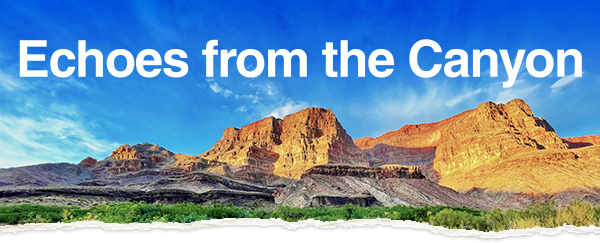
By Rabbi Will Berkovitz, CEO

I recently returned from rowing 23 days through the bottom of the Grand Canyon. It is a hostile place filled with wonder, giant rapids, and boulders older than time. It is empty of distraction. There is no cell service, internet, or news of the world beyond the rim.
There were no masks and no need for social distancing as we were a closed group of 16 people spanning ages from 24 to 75 and rafting on our own. The matriarch of the trip won the rafting permit and invited us. I was “adopted” by her after my mother died when I was in my 20s and living alone in Eugene, Oregon. Now at 75 years old, she saw this as her swan song to the Grand Canyon.
On the river, I came to recognize the importance of true intergenerational conversation—something that seems completely absent today as we navigate some very complicated rapids as a country. As my wife pointed out, “A successful run through big whitewater has everything to do with the approach.” Once the hydraulics of a rapid take hold, the best you can do is stay focused, try to keep your route, and hit the waves straight.
The Colorado River winds muscular and aggressive for 280 miles through the canyon with pauses of immense silence. There were few sounds beyond water, wind, and our voices—life is distilled to its essence. We slept under the stars and woke with the sun. The crescent moon, unnoticed in Seattle, was bright enough to cast shadows and wake the sleeping despite exhaustion. There is an interconnectedness to life that becomes not only visible but tangible. That was also true for those of us on the river. Working together is the only way to safely make it through. We also had to be honest about our blind spots and limitations—physical and emotional. We needed to distinguish between what was discomfort and what was truly unsafe. Unneeded static in the team can lead to mistakes, injuries, and worse. A difficult helicopter rescue is the only way out beyond continuing downriver.
Just as easy as it is to get swept sideways on a big wave or shatter an oar on a canyon wall (something I experienced), it is just as easy to get sucked into a giant eddy—trapped interminably swirling in big, frustrating circles, unable to break free back into the fast-moving current. It is also a mistake to just blindly follow the current without paying attention to what’s coming downriver.
It is disorienting back in the “default world,” as it was called down there. The white noise is as deafening as the distractions: The vast, ideological eddies that keep us trapped in spiraling debates. The ideological currents that will slam us into walls because we aren’t paying attention to what’s downriver. We aren’t pausing to scout the next rapid.

How easy it is to become disconnected from ourselves and the natural rhythms of the world. For 23 days I could hear myself think, and I could learn more about the thinking of much younger people, many of whom held world views and opinions quite different from my own. People who I came to gain a deepening respect for as the miles and days passed. I admired their tenacity, spirit and wisdom, but I also sensed a kind of fatalism—a diminished hope about the future of society and the world.
Back in Seattle, I find myself wondering how many of our communal challenges come from this disconnection and the lack of breathing room for reflection. Within a few days on the river, small talk shifted to unpressured conversation. Time slowed down as the profound immensity around us became measured in eons and millennia and not tweets, hashtags, and 24-hour news. There is time to talk through a thorny, complicated idea or dilemma over days instead of mere moments—to sit in the grey space of experienced reality and not the simplistic caricatures of black and white. We could learn the backstory of people’s ideas and their lives on the stretches between rapids. How their personal challenges shaped their broader thinking.

I am more convinced than ever for the need to create more space for those stretches of reflection and conversation—to understand the lived experiences that mold opinions. And that is most important in the conversations between generations. We all need much more curiosity and far less certainty. We need to work toward a new common language and a mutual respect even if we have profound disagreements. Relationships are built by trust, shared vulnerability, and collective memory. It takes a commitment of time—not trying to indoctrinate, convince or change people, but simply a will to understand them.
Perhaps what has stayed with me more than anything else beyond the immensity and beauty of the canyon itself, is the pure power of the river and the strength of the hydraulics in the rapids. All rivers run to the sea. The river is going to go where it is going to go—and anyone on the water is going to go with it. The goal is to learn how to listen, read, and understand the nuances of the water. It is not possible to control the river; what matters is how we respond to it. And in the end, isn’t that also true about people?
In peace,

Rabbi Will Berkovitz
Chief Executive Officer




Sorry, comments are closed for this post.